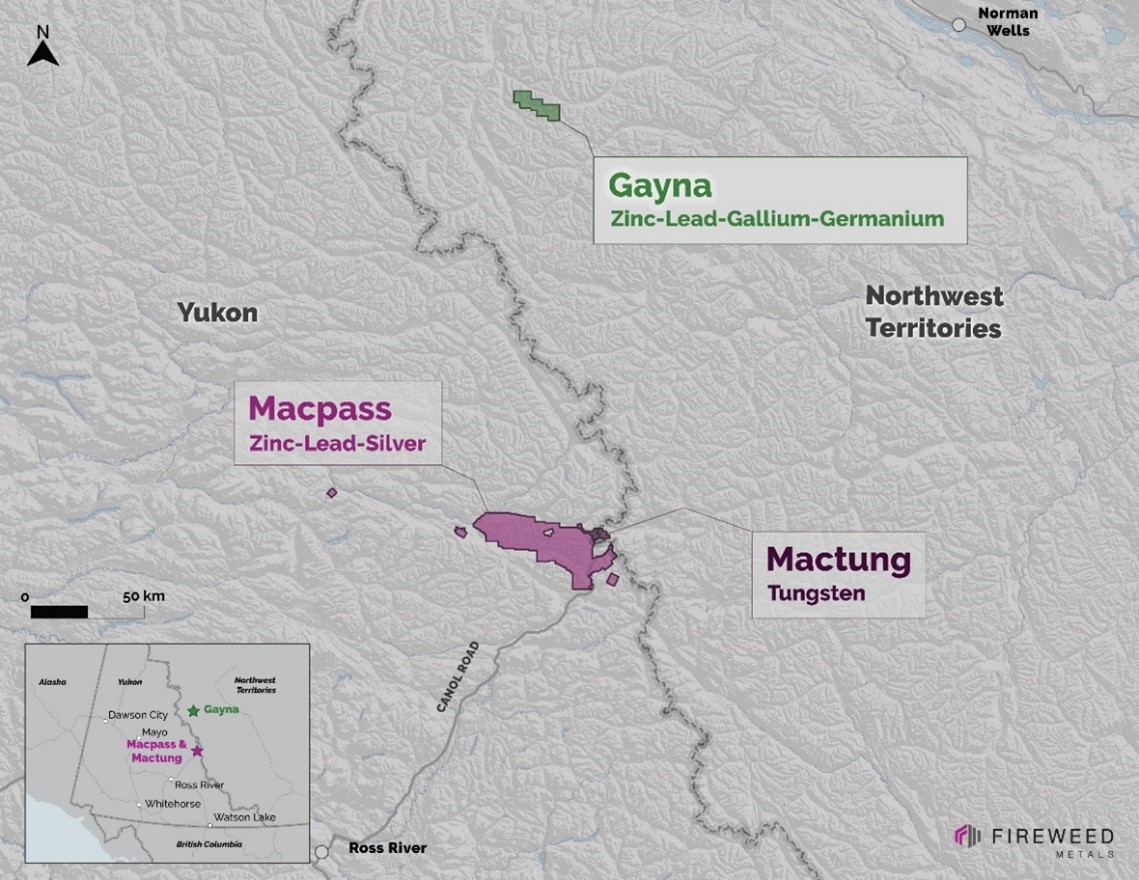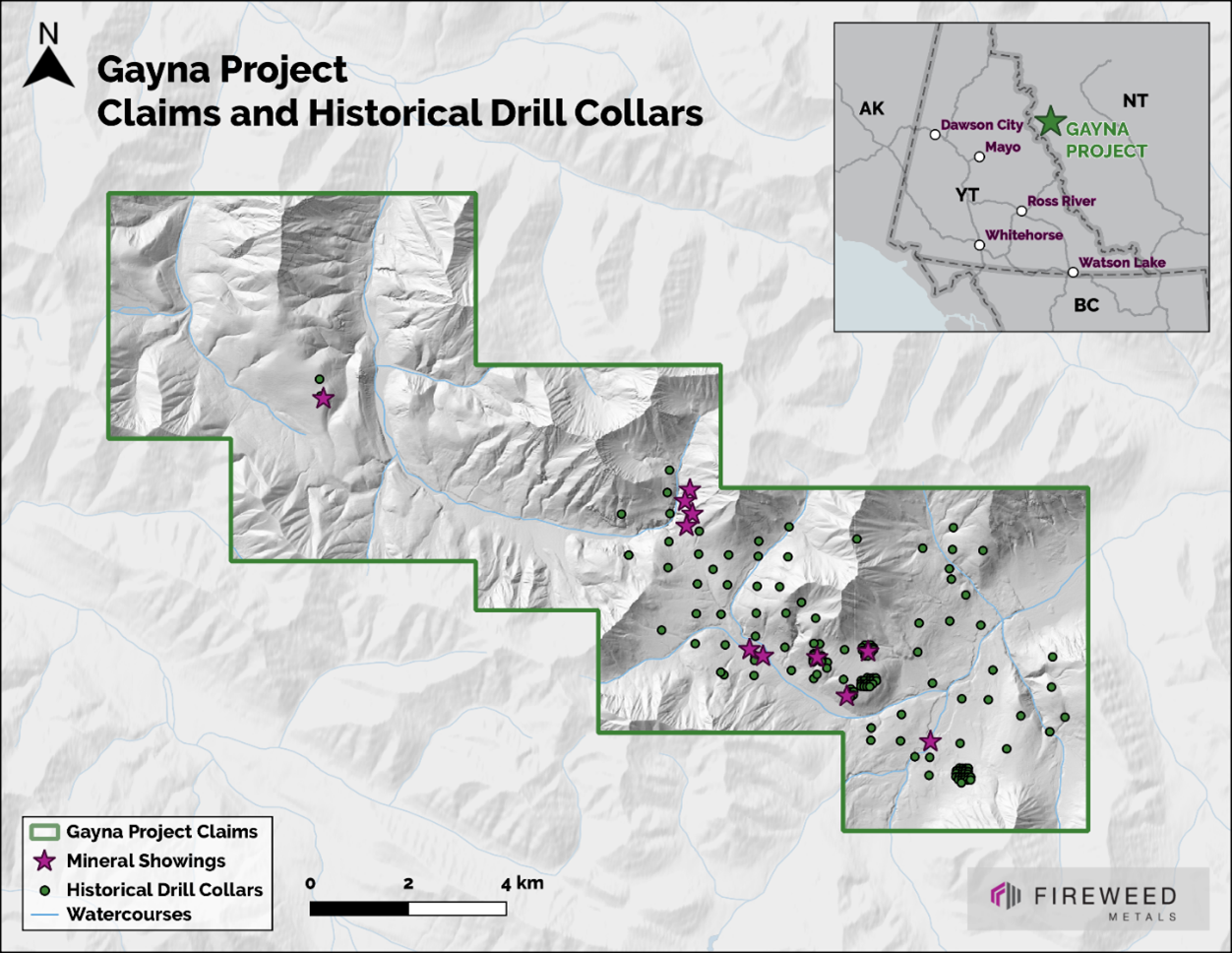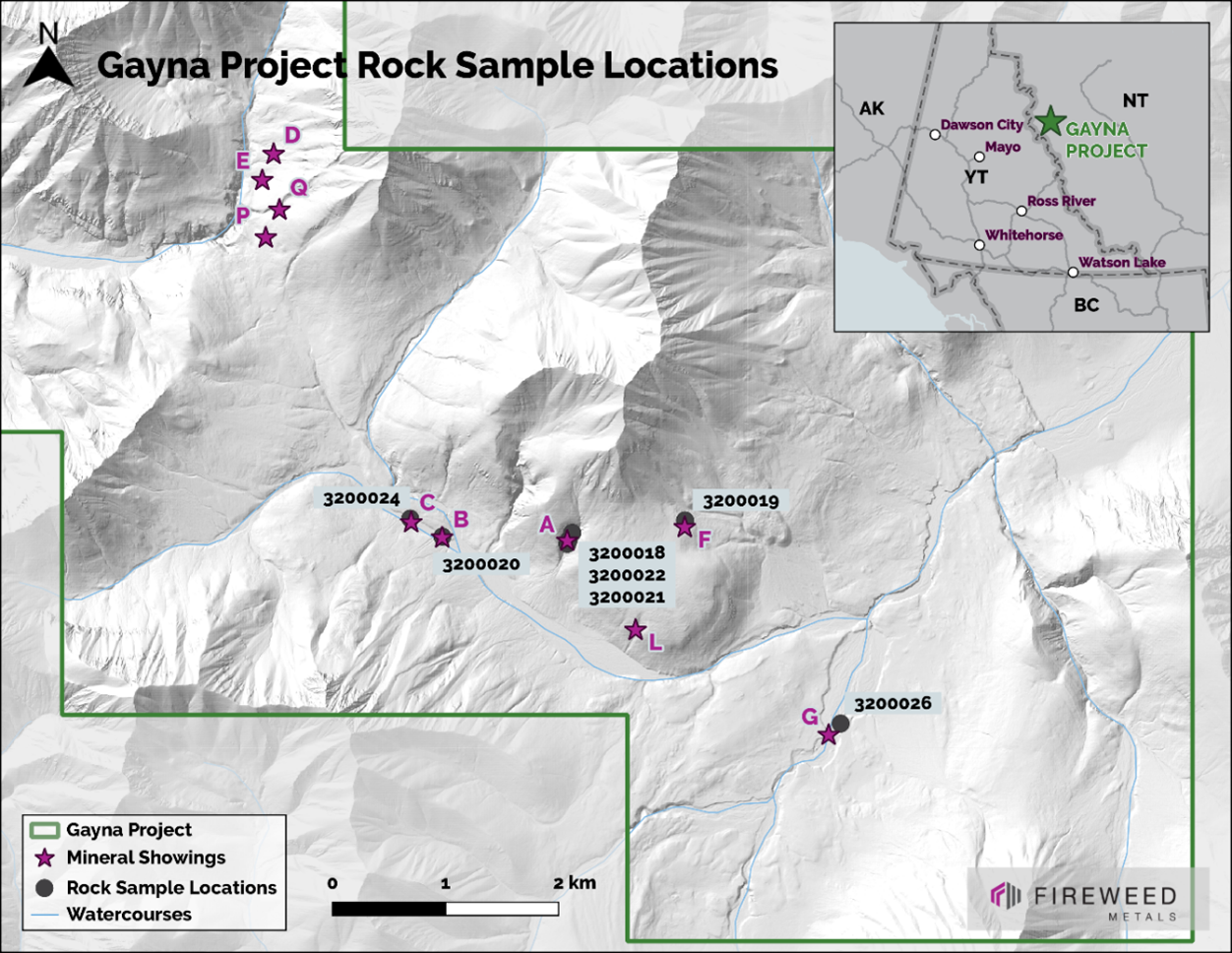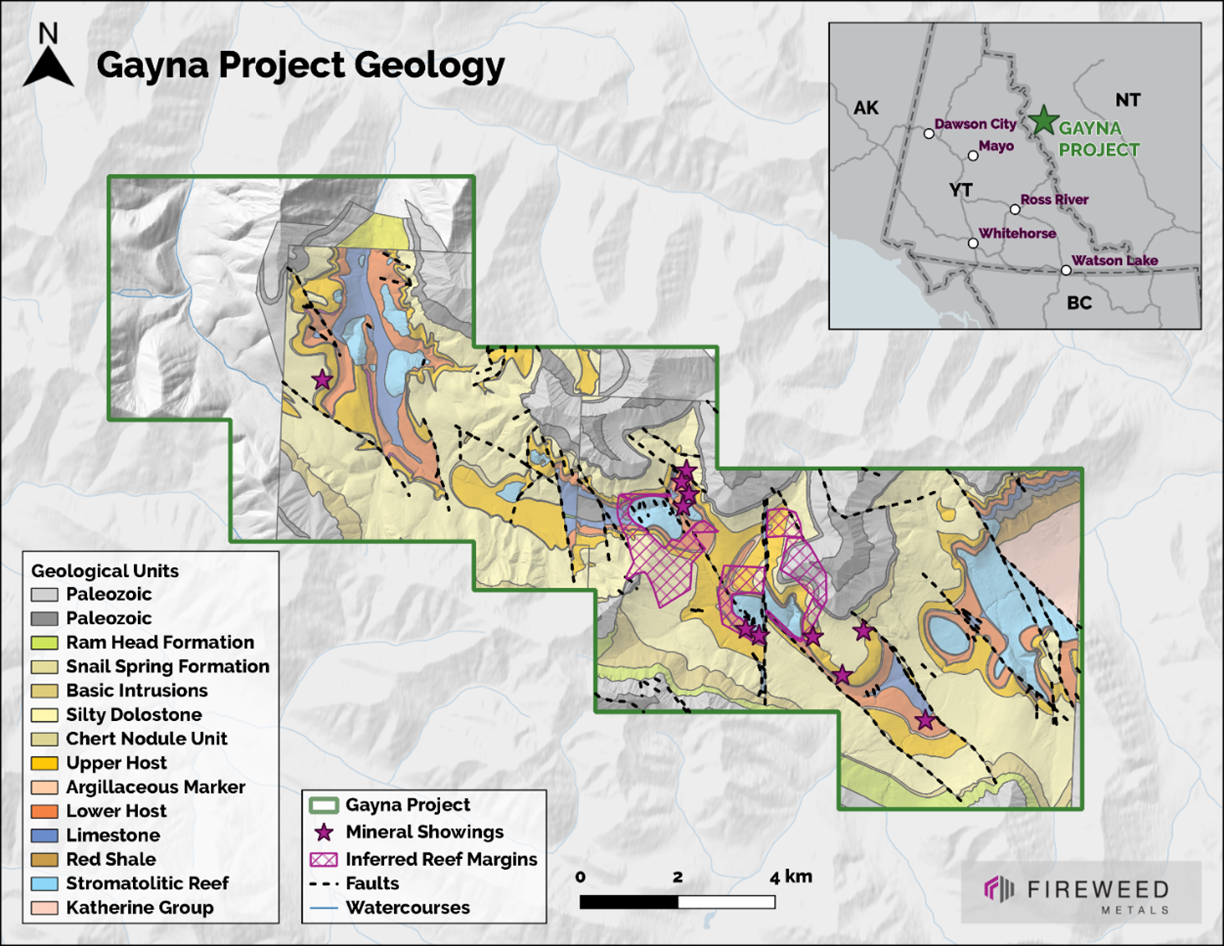Vancouver, British Columbia: FIREWEED METALS CORP. (“Fireweed” or the “Company”) (TSXV: FWZ; OTCQB: FWEDF) is pleased to announce it has completed a geophysical survey on its Gayna Project (zinc-lead-silver-gallium-germanium) (“Gayna” or “the Project”), in the Northwest Territories, Canada (Map 1).
Highlights
- Exploration is targeting reef margin high-grade massive sulphide mineralization using a ground gravity geophysical survey.
- The 2022 geophysical program identified two broad areas with gravity anomalies consistent with Kipushi-style targets.
- The 2023 gravity survey aims to expand the gravity coverage to identify new anomalies, and to refine existing anomalies for future drill-testing.
CEO Statement
Brandon Macdonald, CEO, stated “We are very excited to continue work on Gayna; the new interpretations of historical data combined with our geophysical and geochemical surveys show that the Project has significant potential to host a similar style of mineralization to the world‑class Kipushi deposit. With recent surface samples showing high-grade zinc (Zn) and lead (Pb), the 2023 survey work will allow higher resolution definition of targets in preparation for future drill testing.”
2023 Geophysical Survey
Crews completed a three-week long, low-impact ground gravity survey at Gayna. The survey provided infill coverage of the 2022 grid; covered targets A, B, C, F, and L (Map 4); and expanded the grid to cover more reef-margin targets.
 Map 1: Gayna Project Location Relative to Fireweed’s Flagship Macpass and Mactung Projects
Map 1: Gayna Project Location Relative to Fireweed’s Flagship Macpass and Mactung Projects
 Map 3: Gayna Project Claims and Historical Drill Collars
Map 3: Gayna Project Claims and Historical Drill Collars
Gayna Project (zinc-lead-silver-gallium-germanium)
The Gayna prospects are hosted in dominantly carbonate sedimentary rocks of Neoproterozoic age within the Mackenzie Mountains. These carbonate units consist of a succession of shale-carbonate rocks containing calcimicrobial limestone reefs formed by stromatolites and possibly early sponges. The reefs are surrounded by comparatively deeper-water sediments intermixed with reef-derived talus, with individual reefs several hundred metres to over three kilometres in diameter and hundreds of metres in thickness. This sharp, near-vertical interface between the reef and the surrounding sedimentary rocks is being targeted as an environment analogous to the high-grade Big Zinc Zone at the Kipushi deposit in the Democratic Republic of Congo1. Mineralization discovered at Gayna to date occurs in veins and breccias in carbonate rocks similar to Mississippi-Valley-Type (MVT) mineralization, or Irish-type Zn-Pb mineralization. Sphalerite and minor galena occur as infill within veins, vugs, and breccias along with dolomite-calcite-quartz-pyrite. This mineralization is interpreted as the distal expression of Kipushi-style massive sulphide mineralization that may be present along the subvertical margins of the carbonate reefs. This steep reef margin geometry at Gayna was not tested by historical, sub-vertical drill holes that targeted sub-horizontal, shallowly dipping mineralization. The geophysics work from 2022 shows compelling gravity targets, and the data generated in the 2023 gravity program will guide future drilling programs to test these anomalies using inclined drillholes.
Rio Tinto completed over 28,000 m of exploration drilling at Gayna in the 1970’s to test targets identified by prospecting or soil geochemistry, and to test stratiform targets with a grid drilling approach utilizing vertical holes on a square grid with an average spacing of 600 m between holes (Map 3). Given the vertical holes and the wide historic drill grid spacing, these drill programs left the concept of subvertical bodies of massive sulphide mineralization untested. The Project was restaked by Fireweed in 2022 to test the new exploration concept that Kipushi-style, high-grade massive sulphide may be present at Gayna.
A ground gravity survey, an airborne LiDAR survey, and an orthophoto survey were carried out in 2022 to acquire high-quality geophysical data using modern technology and practices. The results of the 2022 gravity program delineated several gravity-high anomalies over the inferred position of the reef-margins. For an overview of results from the 2022 program, please refer to Fireweed news release dated November 17, 2022.
A limited 2022 rock sampling program at known showings returned samples with high zinc, silver, and lead concentrations, and also contained elevated concentrations of the critical minerals gallium (2 to 42 ppm) and germanium (9 to 99 ppm) (locations of the 8 samples shown on Map 4 and assays in Table 1). The 2022 rock sampling returned a specimen with a spectacular zinc grade of 51.2%, as well as another sample grading 73.7% lead (Photo 1). These samples, while derived from surface boulders, illustrate the potential for an undiscovered source(s) of massive sulphides with extremely high grades, comparable to Kipushi, hosted in the same reef-margin environment. Several extensive, high magnitude lead-zinc soil anomalies present on the Project are not readily explained by the results of the historic drilling and show potential for yet undiscovered high-grade massive sulphide mineralization along the reef-margins.
 Map 4: 2022 Gayna Project Rock Sample Locations
Map 4: 2022 Gayna Project Rock Sample Locations
Table 1: 2022 Gayna Project Rock Grab Samples Coordinate reference system: UTM Zone 9 NAD83
Coordinate reference system: UTM Zone 9 NAD83
 Photo 1: Gayna Project Rock Sample with Massive Galena-Sphalerite
Photo 1: Gayna Project Rock Sample with Massive Galena-Sphalerite
Qualified Person Statement
Technical information in this news release has been approved by Fireweed Metals’ VP Geology, Jack Milton, Ph.D., P.Geo. (BC), a ‘Qualified Person’ as defined under Canadian National Instrument 43-101.
About Fireweed Metals Corp. (TSXV: FWZ; OTCQB: FWEDF; FSE:20F): Fireweed Metals is a public mineral exploration company on the leading edge of Critical Minerals project development. Fireweed is well-funded, with a strong current cash position and is currently carrying out a large 2023 exploration program. The Company has three projects located in Canada:
- Macpass Project (zinc-lead-silver): Fireweed owns 100% of the district-scale 940 km2 Macmillan Pass (“Macpass”) Project in Yukon, Canada, which is host to one of the largest undeveloped zinc resources in the world* where the Tom and Jason zinc-lead-silver deposits have current Mineral Resources2 (11.21 Mt Indicated Resource at 6.59% zinc, 2.48% lead, and 21.33 g/t silver; and 39.47 Mt Inferred Resource at 5.84% zinc, 3.14% lead, and 38.15 g/t silver) and a Preliminary Economic Assessment3 (PEA). In addition, Boundary Zone, Tom North and End Zone have significant zinc-lead-silver mineralization drilled but not yet classified as mineral resources. The project also includes large blocks of adjacent claims with known showings and significant upside exploration potential.
- Mactung Project (tungsten): The Company owns 100% interest in the 37.6 km2 Mactung Project located adjacent to the Macpass Project. Recently announced mineral resources for Mactung (41.5 Mt Indicated Resource at 0.73% WO3 and 12.2 Mt Inferred Resource at 0.59% WO3)4 make it the world’s largest high-grade resource of the Critical Mineral tungsten*. Located in Canada, it is one of the rare large tungsten resources outside of China*.
- Gayna Project (zinc-lead-gallium-germanium): Fireweed owns 100% of the 128.75 km2 Gayna project located 180 km north of the Macpass Project. It is host to extensive mineralization including Critical Minerals zinc, gallium and germanium as well as lead and silver, outlined by 28,000 m of historical drilling and significant upside potential.
In Canada, Fireweed (TSXV: FWZ) trades on the TSX Venture Exchange. In the USA, Fireweed (OTCQB: FWEDF) trades on the OTCQB Venture Market for early stage and developing U.S. and international companies and is DTC eligible for enhanced electronic clearing and settlement. Investors can find Real-Time quotes and market information for the Company on www.otcmarkets.com. In Europe, Fireweed (FSE: 20F) trades on the Frankfurt Stock Exchange.
Additional information about Fireweed and its projects can be found on the Company’s website at FireweedMetals.com and at www.sedarplus.com
ON BEHALF OF FIREWEED METALS CORP.
“Brandon Macdonald”
CEO & Director
Neither the TSX Venture Exchange nor its Regulation Services Provider (as that term is defined in the policies of the TSX Venture Exchange) accepts responsibility for the adequacy or accuracy of this release.
Data Verification
Geophysical surveying in 2022 and 2023 was conducted by a qualified and independent contractor under the direction of Fireweed Metals.
Rock samples from the 2022 field program were sent to the Bureau Veritas preparation laboratory in Whitehorse, Yukon, where the samples were crushed and a 500 g split was sent to the Bureau Veritas laboratory in Vancouver, B.C to be pulverized to 85% passing 200-mesh size pulps. Clean crush material was passed through the crusher and clean silica was pulverized between each sample. The pulps were analyzed by 1:1:1 Aqua Regia digestion followed by Inductively Coupled Plasma Mass Spectrometry (ICP-ES/ICP-MS) multi-element analyses (BV Code AQ270). All samples were also analyzed for multiple elements by lithium borate fusion and X-ray fluorescence analysis (XRF) finish (BV Code LF725). Over-limit lead (>25.0%) and zinc (>24.0%) were analyzed by lithium borate fusion with XRF finish (BV Code LF726). Samples were subjected to fire assay for gold, platinum and palladium by fusion followed by ICP-ES analysis (BV Code FA330), as well as assay for gallium and germanium by hydrofluoric acid and Aqua Regia digestion followed by ICP-MS analysis (BV Code GC204). For rock samples, silver is reported in this news release by method AQ270, zinc and lead are reported by LF725 or LF726, and gallium and germanium by GS204.
Bureau Veritas (Vancouver) is an independent, international ISO/IEC 17025:2005 accredited laboratory. Laboratory blanks, duplicates, and standards were analysed as part of routine data QAQC.
Cautionary Statements
Forward Looking Statements
This news release contains “forward-looking” statements and information (“forward-looking statements”). All statements, other than statements of historical facts, included herein, including, without limitation, statements relating to mineralization potential, interpretation of drill results, future work plans, the use of funds, and the potential of the Company’s projects, are forward looking statements. Forward-looking statements are frequently, but not always, identified by words such as “expects”, “anticipates”, “believes”, “intends”, “estimates”, “potential”, “possible”, and similar expressions, or statements that events, conditions, or results “will”, “may”, “could”, or “should” occur or be achieved. Forward-looking statements are based on the beliefs of Company management, as well as assumptions made by and information currently available to Company management and reflect the beliefs, opinions, and projections on the date the statements are made. Forward-looking statements involve various risks and uncertainties and accordingly, readers are advised not to place undue reliance on forward-looking statements. There can be no assurance that such statements will prove to be accurate, and actual results and future events could differ materially from those anticipated in such statements. Important factors that could cause actual results to differ materially from the Company’s expectations include but are not limited to, exploration and development risks, unanticipated reclamation expenses, expenditure and financing requirements, general economic conditions, changes in financial markets, the ability to properly and efficiently staff the Company’s operations, the sufficiency of working capital and funding for continued operations, title matters, First Nations relations, operating hazards, political and economic factors, competitive factors, metal prices, relationships with vendors and strategic partners, governmental regulations and oversight, permitting, seasonality and weather, technological change, industry practices, uncertainties involved in the interpretation of drilling results and laboratory tests, and one-time events. The Company assumes no obligation to update forward‐looking statements or beliefs, opinions, projections or other factors, except as required by law.
Footnotes and References
* References to relative size and grade of the Mactung resources and Macpass resources in comparison to other tungsten and zinc deposits elsewhere in the world, respectively, are based on review of the Standard & Poor’s Global Market Intelligence Capital IQ database.
1: For details, see Turner, E. C., D. W. Broughton, and T. Brooks. “Neoproterozoic carbonate lithofacies and ore distribution at the Kipushi Cu-Zn deposit, Democratic Republic of Congo, and Gayna River Zn camp, Northwest Territories, Canada.” Economic Geology 113.3 (2018): 779-788.
2: For details, see https://www.sedarplus.ca/ Fireweed Technical Report titled “NI 43-101 Technical Report on the Macmillan Pass Zinc-Lead-Silver Project, Watson Lake and Mayo Mining Districts Yukon Territory, Canada” filed on https://www.sedarplus.ca/ on February 23, 2018, and Fireweed News Release dated January 10, 2018.
3: For details, see https://www.sedarplus.ca/ Fireweed Technical Report titled “NI 43-101 Technical Report Macmillan Pass Project Yukon Territory Canada” filed on https://www.sedarplus.ca/ on July 9, 2018, and Fireweed News Release dated May 23, 2018. This Technical Report includes a Preliminary Economic Analysis disclosing an economic analysis of mineral resources that is preliminary in nature and does not include any mineral reserves. It is equally emphasized that the mineral resources disclosed within this Technical Report are not mineral reserves and do not have demonstrated economic viability.
4: For details, see Fireweed news release dated June 13, 2023 “Fireweed Metals Announces Mineral Resources for the Mactung Project: the Largest High-Grade Tungsten Deposit in the World” and the technical report entitled “NI 43-101 Technical Report, Mactung Project, Yukon Territory, Canada,” with effective date July 28, 2023 filed on https://www.sedarplus.ca/
Contact: Brandon Macdonald
Phone: (604) 646-8361
Email: info@fireweedmetals.com


